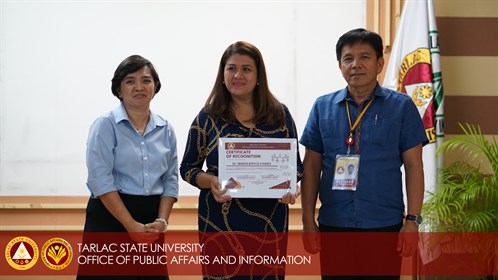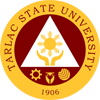IPDO conducts first GIA Roundtable Conference – Outputs with Industries, Established

To provide a platform to address the areas on the performance of Tarlac State University graduates and on-the-job trainees, faculty-industry immersion, research collaboration, and innovation, the Institutional Planning and Development Office (IPDO) conducted the first Government-Industry-Academe (GIA) Roundtable Conference on July 9, 2019 at the TSU Alumni Center, Lucinda Extension Campus.
Various industry partners, government agencies, and representatives from the different colleges of TSU attended the event.
The program was divided into two parts – a keynote speech in the morning and roundtable discussions in the afternoon.
The plenary session commenced with an opening spiel from the master of ceremony, Mr. Jerich Lobo, which was then followed by Ms. Nikita Balagtas’ invocation.
Dr. Grace Anne Canlas-Hasegawa, IPDO Director, welcomed the guests with a speech.
“We want to develop new partnerships with leading companies and institutions, so the transfer of knowledge is not only confined to classrooms but to the real world,” said Dr. Hasegawa.
Prof. Redemptor G. Toledano, OIC Vice President for Planning and Quality Assurance, formally opened the program followed by a message from the University President, Dr. Myrna Q. Mallari, who was represented by Dr. Glenard T. Madriaga, Vice President for Administration and Finance.
After the messages, Dr. Maria Bryce Fabro, the keynote speaker, started with her presentation which she called “Skills Every Student Will Need to Succeed in the 21st Century.” The speech focused on the seven skills that may help the academe and industry understand students which are: ME, WE, Y, WILL, WIGGLE, WOBBLE, and WHAT IF skills.
The floor was opened for questions after Dr. Fabro’s speech as ideas started to flow in the minds of the attendees. This concluded the morning session of the conference.
The second part of the conference started immediately after lunch. The participants were grouped into six roundtable conferences which are as follows: Group A - College of Arts and Social Sciences, College of Public Administration and Governance and College of Criminal Justice Education; Group B - College of Teacher Education; Group C - College of Computer Studies and College of Business and Accountancy; Group D - College of Science; Group E - College of Engineering and Technology; and Group F - College of Architecture and Fine Arts.
Each group had their own facilitator from TSU, and each participating agency was given a chance to present the performance competencies and areas for improvement of graduates employed in their companies for them to identify possible collaborative activities between their institution or company and TSU.
The event ended well as outputs came along, linkages were formed, and future activities were established.
“Hopefully, the next GIA Roundtable Conference will be done in every college,” Dr. Hasegawa said as a positive improvement for the next GIA conference while bearing the success of the first.
Outputs of the GIA roundtable conference will be incorporated in the action plan and Medium-Term Development Plan of the participating colleges. This conference is a huge step for the university in its journey towards the attainment of its vision of becoming a premier university in the Asia Pacific Region. [Jerich Ralph S. Lobo, IPDO]

